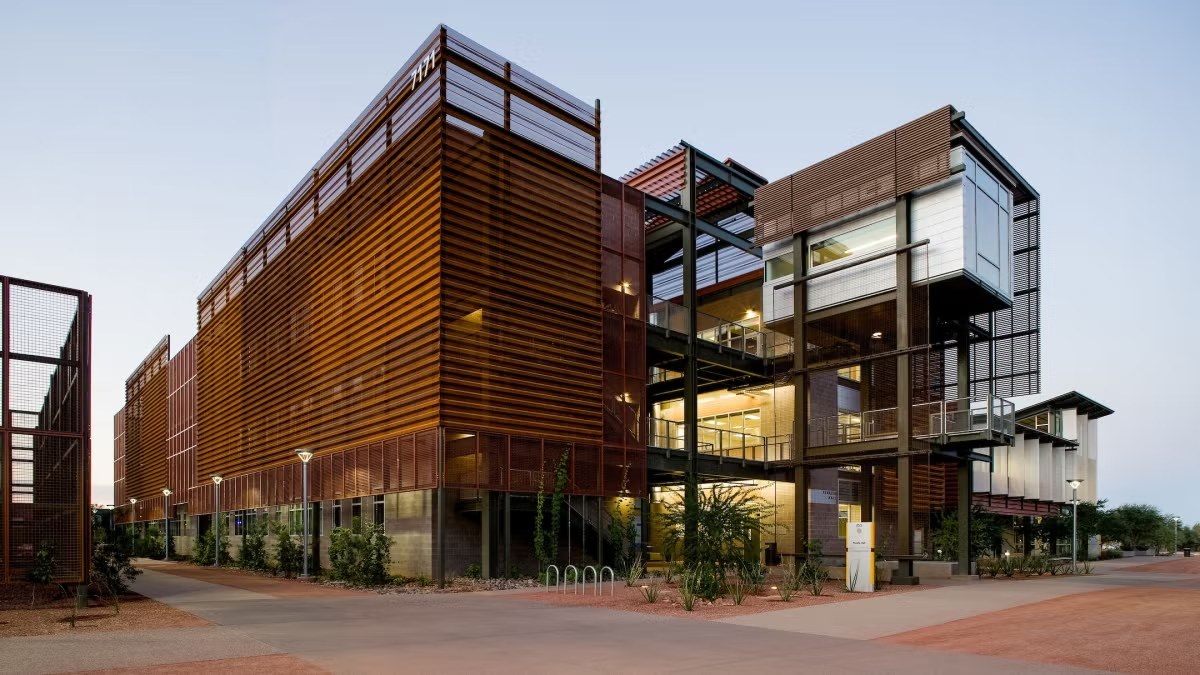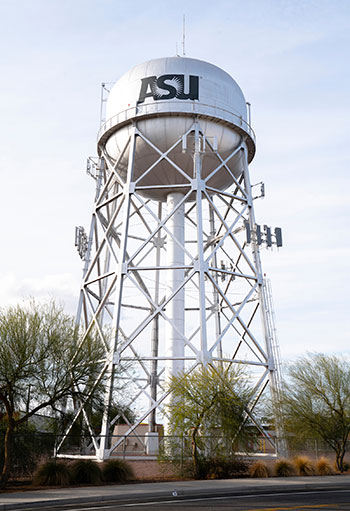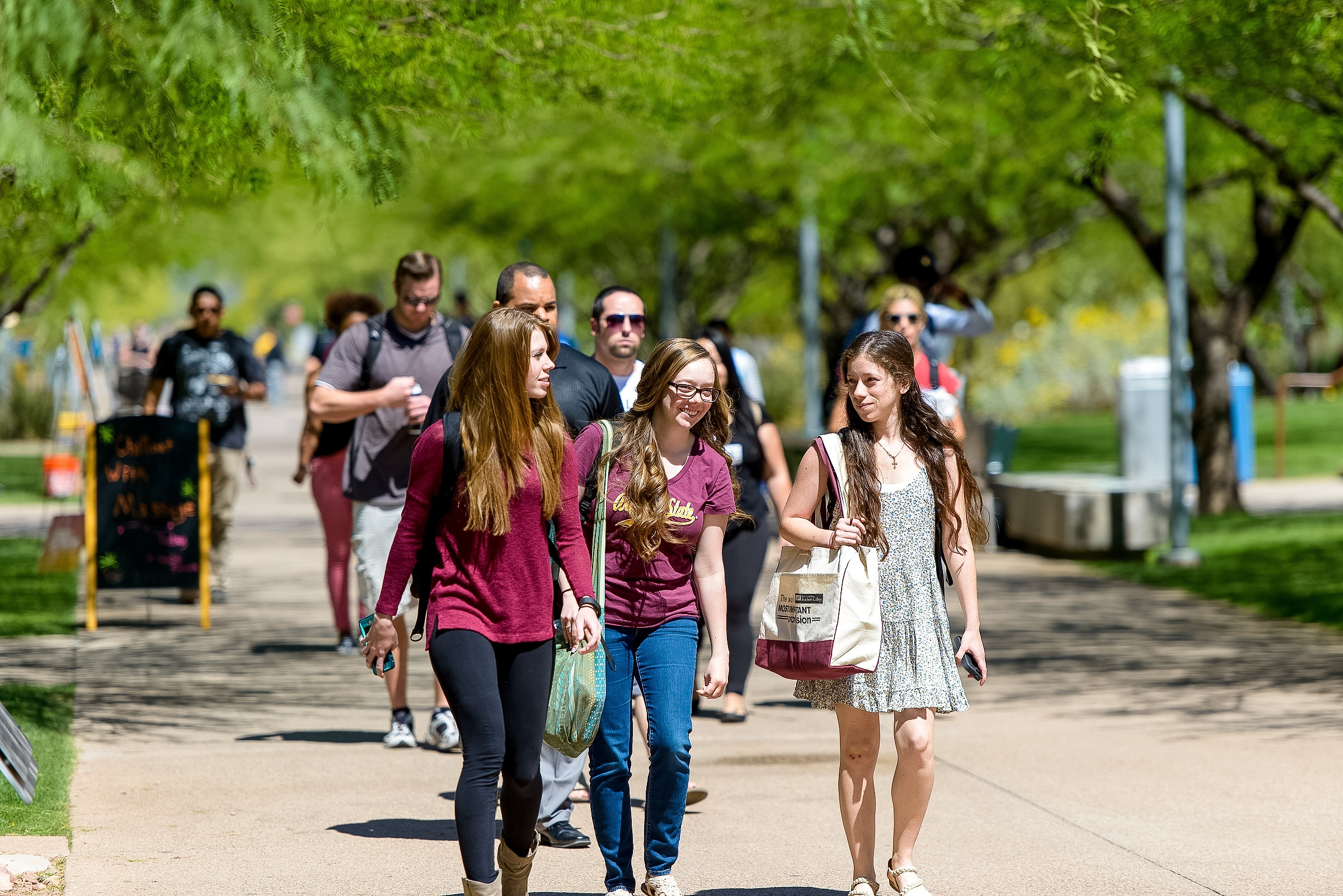ASU's College of Integrative Sciences and Arts reorganizes into 3 new schools

Santa Catalina Hall on the Polytechnic campus. Photo by ASU
Editor’s note: This story is featured in the 2023 year in review.
The College of Integrative Sciences and Arts at Arizona State University is reorganizing to better serve students and meet the needs of the East Valley community around ASU’s Polytechnic campus.
The new model, with three new schools, will boost the college’s identity as a distinctive arts and sciences college, grow affinity among students and faculty through applied learning, better align with the rest of the university and increase efficiency, according to Joanna Grabski, dean of the College of Integrative Sciences and Arts, or CISA.
“CISA is a dynamic college, and the three-school model is the result of an expansive and thorough process of collaboration that establishes an organizational structure to optimize our distinctive applied degrees and career-connected learning focus,” she said.
The move was critically important to support the changing needs of ASU’s students and the communities served by the college, said ASU Executive Vice President and University Provost Nancy Gonzales.
“The reorganization will build infrastructure and position CISA to pursue new strategic directions and applied degrees that are desired by today’s students and workforce across the state and nation, and particularly in the East Valley,” Gonzales said.
“Although CISA offers degrees and courses at three of ASU’s metro campuses, the Polytechnic campus located in the heart of the dynamic and rapidly growing East Valley offers untapped potential for new interdisciplinary programs that CISA will now be poised to lead.”

The water tower is a distinctive part of the Polytechnic campus' skyline. “Although CISA offers degrees and courses at three of ASU’s metro campuses, the Polytechnic campus located in the heart of the dynamic and rapidly growing East Valley offers untapped potential for new interdisciplinary programs that CISA will now be poised to lead,” said ASU Executive Vice President and University Provost Nancy Gonzales. Photo by ASU
The degree programs in the college will be organized into the following three schools, with searches underway for directors:
- The School of Counseling and Counseling Psychology, which will include undergraduate and graduate counseling and counseling psychology degree programs with several focus areas and fields of faculty expertise such as sports and performance counseling, K–12 school counseling, bilingual and bicultural, LGBTQ, military and veterans, first responders and deescalation.
- The School of Applied Sciences and Arts, which will include applied sciences degrees with concentrations such as pre-dental, pre-veterinary medicine, natural resource ecology, secondary education in biology and sustainable horticulture, as well as liberal arts degrees such as English, communication and history.
- The School of Applied Professional Studies, which will include degrees in organizational leadership, project management, and technical communication.
“Creation of a hub at the ASU Polytechnic campus for (these schools) will provide opportunities for impact and will optimize our current assets in ways that serve ASU students and the community,” Grabski said.
Currently, the College of Integrative Sciences and Arts has eight faculty groups serving majors and general studies students at the Polytechnic, Tempe and Downtown Phoenix campuses, and through ASU Online. Unlike most other ASU colleges, the college previously had no schools or departments.
The College of Integrative Sciences and Arts also offers degrees at several two-year colleges around the state. Coursework is delivered at these sites, allowing transfer students to earn a bachelor’s degree near their homes. The college also offers a general studies degree at the ASU at Lake Havasu location.
Under the new three-school structure, the Polytechnic campus will be the college’s hub, and faculty and staff will plug into the schools from wherever they are and continue to serve students wherever they are.
With the reorganization, some programs will be expanded and others will be added.
The School of Counseling and Counseling Psychology will add concentrations in sports and performance counseling, and school counseling, and it will offer some existing programs online for the first time, according to Laura Jimenez Arista, clinical assistant professor of counseling and applied psychological science.
“The addition of new programs that address market demands can provide students more options, so they can choose degrees that will satisfy the labor needs in our current economy and society,” she said.
The new model will help give the college’s faculty and students a stronger sense of identity, said Manuel Avilés-Santiago, associate dean for academic programs and curricular innovation in the College of Integrative Sciences and Arts.
“We were the only (arts and sciences college at ASU) that didn’t have a school structure, and at ASU that makes it a little challenging. It was hard to explain that CISA was a liberal arts college without having that structure,” he said.
That enhanced identity will make it easier to form community partnerships to benefit students, he said. For example, the School of Counseling and Counseling Psychology will be instantly recognizable to school districts looking for partnerships.
Under the College of Integrative Sciences and Arts reorganization, some programs will be expanded and others will be added, providing students with more options and addressing labor market demands. Photo by ASU
The reorganization process took almost two years and involved extensive collaboration among faculty and staff, with a lot of listening sessions conducted by Grabski’s team and the University Design Institute.
Igor Shovkovy, a professor of physics in the College of Integrative Sciences and Arts, said the design process was rigorous.
In 2021, faculty were asked to fill out a design-challenge questionnaire listing which degrees they believed were the most impactful and how to optimize existing expertise.
A year ago, a virtual meeting invited everyone to express their ideas and hear input from others. The next phase was done in several work groups, addressing specific curricular issues.
“Building on CISA’s existing strengths, Dean Grabski and her colleagues utilized a thoughtful process of inclusive design work with CISA faculty and multiple other stakeholders that also integrated insights and emerging trends in higher education,” Gonzales said. “I am excited to see how this forward-looking approach will benefit CISA’s students, faculty and staff and the communities they serve in the years ahead.”
Shovkovy said he believes the reorganization will create a greater sense of community among faculty and lead to new research collaborations for faculty and research opportunities for students.
“Schools with clear identities will boost the visibility of their faculty members. Hopefully, it will help to bring additional external funding, create new collaborations with industry partners and establish stronger connections with the local communities,” he said.
The Arizona Board of Regents voted to approve the new schools earlier this semester.
“ASU’s mission to evolve as a university that is responsive to the communities it serves is ongoing, and our plans for the College of Integrative Sciences and Arts reflects that commitment,” ASU President Michael M. Crow said. “We appreciate the support of the Arizona Board of Regents as we advance plans, and we look forward to the impact these new schools and their future graduates will have in Arizona and beyond.”
More University news

ASU community exceeds goal, raises $835K for Valley of the Sun United Way
The Arizona State University community stepped up and raised over $835,266 for the Valley of the Sun United Way — exceeding the $800,000 goal for 2024.Of the total, $802,192.17 was raised through…

ASU launches online ocean futures undergraduate degrees
Our oceans make up three quarters of the planet’s surface and contain most of its biodiversity. Due to rapid and global changes, they are endangered — making more urgent a deeper knowledge of ocean…

ASU public affairs graduate programs rise to No. 11 in nation in US News & World Report’s 2025 rankings
Arizona State University rose to No. 11 nationwide for best graduate public affairs programs in U.S. News & World Report’s 2025 rankings, the magazine announced.The ranking, released April 8,…


